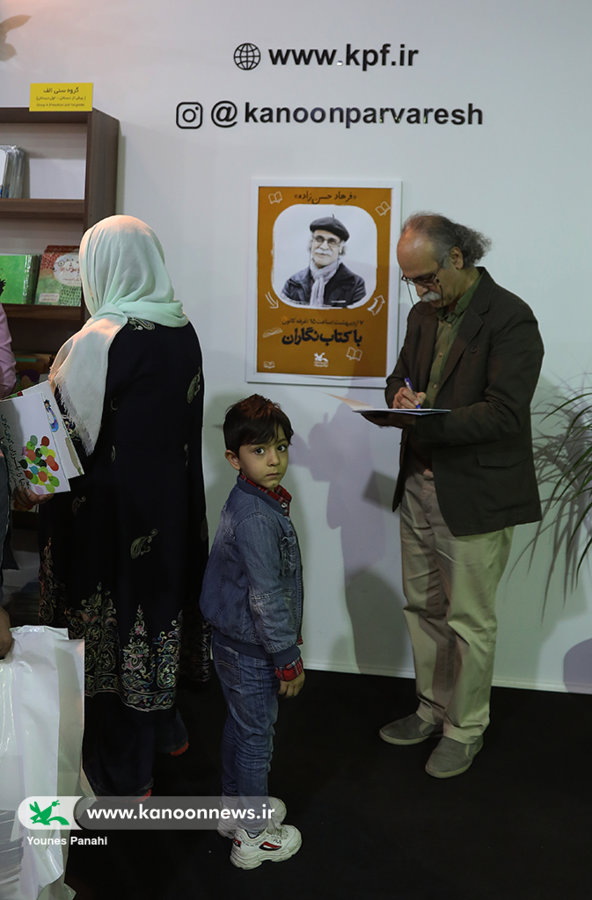Kian JavadiThe author and creator of Kooti Kooti in an interview pinpointed that, “The atmosphere in our stories
is real; children are very cautious and constrained. They never risk or go after adventures. While in meetings, they show lots of interest towards fear, humor, and love.”
He said, “Children like to identify with characters in the story and put themselves in their stead. When they talk about the main character of the novel “Hasti”, they say we feel ourselves close to her. They ask us to create characters to be close to their thoughts and feelings. They ask us to talk about matters that matter to them. Adolescents sometimes imply and sometimes say openly that they prefer the stories with the theme of “love”.
The author of the “Hasti” believes part of this goes back to the authors themselves whether they care about such themes or not. Of course, one part goes back to the censorship employed by some certain governmental institutions or the authors themselves censor themselves and do not talk about “love”.
He said, “I believe we can make the red lines faint or keep them next to other lines, what I did in Hasti. I mean next to a theme like “war”, there is a delicate and light love and children can sense it.”
There is no time for literature
Hassanzadeh talks about his experience about using various times in his novels and the way adolescents reacted to those novels; he said their feedback was positive. He said, “I talked about Iran-Iraq war in “Hasti” and in “This Weblog is Turned Over”. I used the technique used for writing weblogs which is a new technique though the time goes back to the past. I believe there is no time for literature. A story may happen at any time.”
The author of “Call Me Ziba” continued, “At present, I am working on an idea for a novel taking place at the time of Ghajars which means a time much farther than the time of the war. Therefore, we cannot conclude that children do not read such stories. On the contrary, they must read stories about various periods of history to get familiar with atmospheres of those eras yet the important thing is the plot, design and the language the author uses. To write “Hasti” I consulted various people and tried to move on the right path. I believe I was almost successful. ”
I came to know the nature of war through Hasti
About the adolescents welcoming “Hasti” and its impact on them, he said, “In some trips to various Iran provinces, children ask me to write the second and third part of this novel.”
Even some adolescents told me that they came to know Iran-Iraq war not through the media but through this novel, “Hasti”. I am happy that children of this age and with different outlooks liked the book and are asking for second and third volume of the novel.
Adolescents from Turkey have expressed their interest towards “Call Me Ziba”
He pointed at the feedback on his other novel, “Call Me Ziba” published in Turkish. He said, “Three thousand copies were published in Turkey, half was sold in a year. Turkish adolescents send photos of the cover of the book on their Instagram and Facebook pages. They leave positive comments about the novel. On my trip to Greece, I had the chance to talk to two members of the jury for Anderson Award; they talked about “Hasti” and “Call Me Ziba” with enthusiasm. They said these two novels had changed their viewpoints towards Iranian Child Literature. They even said they would like to introduce these novels to other publishers from other countries to be published in other languages.
Weak cultural structures are barriers to Iran literature success worldwide
In reply to the question that why Iran Child Literature fails to win awards like Anderson although there are positive feedback, Hassanzadeh said, “Writing is an individualistic job. The author must first write to satisfy their soul, and then think about the audience and creating a good work. I believe it is the shortcomings of cultural structures in our country which affects international areas. Writing is not considered as a profession in our country. Iranian authors do not have professional lives. Writing is a second or third job for them.
The author of “Mr. Color and the Naughty Cat” added, “When cultural structures are fixed and the conditions for books and reading books get better, then circulation increases and the feedback the author receives will be a good one, then, authors will have a better life, a professional one. Meanwhile, part of the structure reform depends on the government supporting publication and good works welcomed by the society. All these shortcomings can easily been seen. That is why authors are doing their best to improve the conditions. Yet, certain other conditions are not authors’ duties.
Hassanzadeh put an end to his talks by a quote from a well-known Chinses author who was a guest at the 32th Tehran International Book Exhibition, Chau Van Chuan. When he was asked how many books he has published so far, he replied, “I have no idea and I do not care. I just write and then it is my agent’s job to do the rest.”
While in Iran, after completing the novel or the story, the author must start looking for a publisher, making contracts, getting the copyright money and the like. When authors are able to write stories with no worries, then naturally they will create better works.

